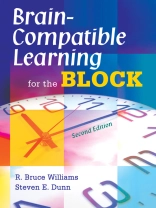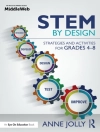‘Provides a clear understanding of the instructor′s responsibilities when teaching in the block, explains what a brain-compatible class looks like, and gives sample lesson plans.’
—Randy Thompson, Educational Consultant
‘Educators who teach in a school system that utilizes block scheduling will find this text very useful.’
—Melissa Awenowicz, Coordinator of Field Placement
University of Pittsburgh
Use brain-friendly teaching strategies to maximize the benefits of extended time formats!
Believing that block scheduling is one of the best environments for applying brain-compatible instructional methods, the authors have compiled a rich resource to show both novice and veteran teachers how to use brain-friendly strategies in extended time periods to deliver highly effective instruction and enhance learning for all students.
A practical toolbox for teaching in block schedule formats, Brain-Compatible Learning for the Block, Second Edition focuses on a four-phase lesson model of inquiring, gathering, processing, and applying. This approach helps learners identify what they already know about the concepts or skills to be covered in the lesson, collect new information related to the lesson topic, engage in activities that will help the brain store new information, and transfer what they′ve learned to real-life settings.
Written for middle school and high school educators, this second edition:
- Provides detailed sample lesson plans
- Examines how extended time formats impact student achievement
- Illustrates how to focus the learning experience for students
- Explores various alternative scheduling formats
- Offers updated research related to brain-based learning and block scheduling
This book provides educators with concrete and accessible ideas for combining brain-based strategies with extended time formats and is an essential resource for making the most of block scheduling.
Cuprins
List of Tables and Figures
Preface
Acknowledgments
About the Authors
Introduction: Tools of the Trade
1. Physiology and Philosophy
The Brain′s Structure and Function
Brain-Compatibility and Multifaceted Learning
Brain-Compatible Learning Climate
Sample Four-Phase Lesson–What′s On Your Mind?
Reflective Questions
2. Four-Phase Lesson and Unit Design
Inquiring-Gathering-Processing-Applying
Four Phases Assist in Schema Development
Essential Questions
Attend–Experience–Reflect
Internal Structure
Integrated Assessment
Compare/Contrast Four-Phase Lesson With Traditional Lessons
Benefits of Four-Phase Lesson Design
Planning a Unit and a Lesson
Reflective Questions
3. Extended Time Formats Including Block Scheduling
Time for Brain-Compatible Learning
Alternative Scheduling Formats
Sample Four-Phase Lesson: Can Prejudice Kill a Mockingbird?
Reflective Questions
4. Content and Curriculum
To Cover or to Catalyze Learning?
Prioritizing Curriculum in Extended Time Formats
Brain-Compatible Curriculum
Sample Four-Phase Lesson: Circles That Cycle
Reflective Questions
5. The Art and Science of Teaching in Extended Time Formats
Opportunity for Growth and Change
Energizing Educational Principles
Brain-Compatible Instructional Strategies
Professional Learning Communities: Pathway to a New Paradigm
Reflective Questions
6. Assessment: Measuring Achievement and Growth in Extended Time Formats
The Right Stuff
Caught in the Act of Learning: Authentic Assessment
Assessment for Learning
No Child Left Behind (NCLB)
Testing Matters
Assessment in Four-Phase Lesson and Unit Design
Sample Four Phase Lesson: Science Schmience or Who Framed Sir Isaac
Reflective Questions
Bibliography
Index
Despre autor
Steven E. Dunn, Ed.D., currently resides in Wichita, Kansas with his twin sons. His two daughters live and work in Chicago, Illinois. Dr. Dunn joined the School of Education faculty at Newman University in the fall of 2002. Before joining the Newman faculty, Dr. Dunn worked as an independent consultant beginning in 1992. His mission as a consultant was to provide professional development in effective instructional strategies, learning theories, service learning, curriculum development, classroom management, and related educational topics. During the decade he was a full-time consultant, Dr. Dunn was an author, trainer and consultant for several educational and business agencies including USAID Mission in Bosnia-Herzegovina Education Department Brcko District; International Youth Foundation in Skopje, Macedonia; Quest International and Lion’s International throughout the United States and in Iceland, Poland, and Lithuania; Skylight International Renewal Institute throughout the United States; Ted Anders Company from Atlanta, Georgia; National Children’s Educational Reform Foundation in Hartford, Connecticut and Dallas, Texas; American Management Systems and Army JROTC in Hampton, Virginia; National Endowment for Financial Education (NEFE) in Denver, Colorado; and Church of God Hispanic Educational Ministries in Cleveland, Tennessee. Dr. Dunn earned his bachelor’s and master’s degrees from Utah State University, and his Ed.D. from Brigham Young University. He was a high school English teacher and coach at Weber High School in Ogden, Utah. He has also taught on the faculties of Bowling Green State University in Bowling Green, Ohio and Utah State University in Logan, Utah. Dr. Dunn currently teaches graduate education courses at Newman University.












